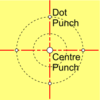Twist Drills
From DT Online

Description
Twist Drills are the most commonly used drill bit and are suitable for drilling most materials including Mild Steel. They are more completely known as Morse Twist Drills, named after the American Engineer, Stephen A. Morse who first developed them in 1864.

Features and Uses
Most Twist Drills have a Parallel Shank and, for everyday use, come in sets covering Drill Sizes up to 13mm diameter. Larger diameter drills may have a reduced diameter shank to fit into Portable Electric Drills or can have a Morse Taper Shank, (also named after Stephen A. Morse), which fits directly into the hollow spindle of a Bench Drill, Pedestal Drill or Lathe Tailstock for example. Drill lengths too can vary but the most common are the Jobber length of drill.
Whenever a large hole has to be drilled, it is good practice to first drill a smaller pilot hole to act as a guide.

Note: For accurate drilling through harder and smoother surfaced materials such as steel, hole centres should be marked with a Centre Punch and when extreme precision is required, the hole diameter should be scribed with Dividers and its intersections with the two axes marked with a Dot Punch - an accurately drilled or bored hole would cut each of the dot punched marks in two!
Maintenance and Manufacture

Twist Drills can be sharpened using a Bench Grinder and are usually ground to a Cutting Angle of 59° to its axis for general work (to create a Point Angle of 118°) but this can vary for hard or soft materials (e.g. 45° is more suitable for Cast Iron and Brass).
Most modern Twist Drills are manufactured from High Speed Steel (HSS) and sometimes coated with Titanium Nitride for example, to harden the surface and give it a gold-coloured look. This is suitable for most materials but for drilling holes in masonry, a Tungsten Carbide Tip is Brazed on.
Dowel Bits

Ordinary HSS Twist Drills can be used to drill wood but, because of its fibrous nature, this can result in the Grain tearing and leaving a rough edge to the hole. Dowel Bits (aka Brad Point or Spur Point drills) are not ground to the usual Point Angle but are sharpened to have a small point at the tip of the bit and spurs on either side which first cut across the Grain to ensure clean, straight holes.
They can often be made of Carbon Steel instead of HSS and, if so, are not suitable for use on harder metals but similar drills can be used for drilling plastics and some softer metals such as Copper. Sharpening is best achieved using a file or the edge of a grinding wheel.
- Traditional Number Drill sizes and Imperial Drill sets are included but these can be replaced for most purposes by choosing a Metric Drill size to the nearest 0.1mm. This is true also of Letter Drill sizes. See drill size Equivalent Charts.










